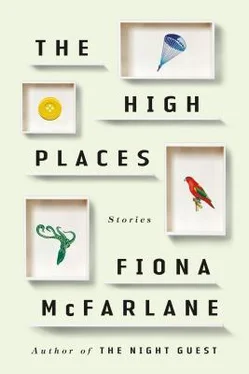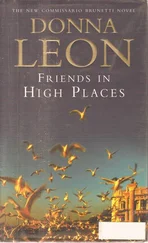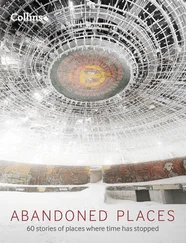They spent Christmas at Ellie’s parents’ house because Henry’s mother had gone to her sister’s. Henry was wary of the differences between this house and the one he would soon inherit: the strong grey-green light that filtered through the gum trees and was reflected in the vague watercolours hanging on the dining-room walls, the simplicity of the furniture, and the surprising number of books. There was a balding in the carpet; his mother would have covered it with a rug. After the meal, Ellie’s father rose before the assembled guests — there were quite a number of cousins — and delivered his annual speech, in which he summed up the events of the past year, both private and public. Henry, who was attentive to the gestures of other men, to the small and large ways in which respect was granted and withheld, noticed — much as he had noticed the worn carpet and the books — that Ellie’s father never once met his eye during the speech, not even when announcing his daughter’s engagement. Her mother, in contrast, peered at her future son-in-law from behind her glasses.
At an appropriate time that evening, Henry steered Ellie out into the garden and quizzed her about her parents. At first she wouldn’t say much, except, shyly, ‘They have ideas.’
‘What does that mean?’ he asked.
Ellie made a small, anxious motion with her hands, as if someone, from a long way off, had thrown a ball in her direction.
‘Do they like me?’ he asked.
‘I told them you wanted me to give up my art appreciation,’ she said, without looking at him, and when he made a noise of irritation she began to speak very quickly about things that didn’t seem to matter. She told him that her mother was, in fact, a remarkable woman, and that if her family had held on to their money she would have done so much more — she’d have trained as an artist and would be famous now. Ellie said that her father had been adored by every student he’d ever taught, but that his pride had suffered when he was forced to retire; that they wanted, more than anything else, to see her go to university, but she was tired of living beautifully on too little money, tired of her parents’ belief that education was worthy of any sacrifice, and wanted to prove to them how possible it was to take a job in the world, so far into the heart of the world as an insurance firm, and still love art. Because she did love art. Then Ellie pressed herself into Henry’s arms and laid one damp cheek against his shoulder. All this while the mynah birds plunged from the junipers, frightening other birds away.
He said, gently, ‘Did you tell them about the lottery?’
Ellie shook her hidden head to say no.
‘Why not?’
And she raised her face and said, ‘They would think I was only marrying you for your money.’
Her face disappeared again, and her thin shoulders rose and fell. Now she was crying. She was so young — only twenty — and passing into his keeping. If marriage was going to be like this, with Ellie at his shoulder, exhausted by honesty and, despite her parents, sure of the way to happiness, then he could manage. He could flourish, in fact, and win; the threadbare carpet and the watercolours could no longer laugh at him. He moved his mouth amid her dark hair and said, ‘My Ellie, my sweet girl.’
* * *
Henry’s mother returned from Victoria on the arm of a man named Arthur. Arthur was short and fox-coloured, with freckles and a muddled smile under a neat red moustache. Like Henry, he was in the ‘insurance game’; he also liked to spend his ‘bit of money’ on a Friday night and was disappointed to learn that Henry no longer went to the dogs. He had a habit of jogging his shoulders up and down as he talked. Henry viewed him with suspicion and had to know everything. His mother offered it all up: how they had met (on the train to Melbourne), where he lived (in Sydney’s west), what he expected of her and she of him (she couldn’t say — not yet). There was no question she wouldn’t answer; there were also some she answered that he hadn’t asked. There had been no intercourse. She told Henry everything and then went away and told the telling of it to Arthur, so that Arthur sat Henry down one Sunday afternoon while Henry’s mother produced a purposeful clatter in the kitchen and said, ‘What you want to know is, am I on the make?’
Henry liked Arthur’s candour; he liked straightforward talk. It showed a respect, he thought, for all parties. So the two men talked it all out in the shuttered light of the Sunday house: Arthur’s wages, his savings, what he knew of Henry’s mother’s winnings, what he knew her to have promised Henry.
‘Never an actual sum,’ Henry said. ‘But it’s understood. She wants to see me set up in life.’
‘Like any good mother,’ Arthur said, lifting and dropping his shoulders, ‘who has the means to do so.’
Henry approved of Arthur after this discussion, and, when Ellie expressed doubts, came to his defence. She was jumpy in Arthur’s presence, and her refusal to respond to his mild flirtations made her seem prudish and ill-humoured. Henry could see that his mother was happy and that happiness suited her; that she was made for contentment, for padded hips, for the kind vulgarity of a man like Arthur (that was how Henry saw him — clearly, he thought, through Ellie’s eyes as well as his own). When Ellie kept away from the house and from Henry’s mother, Henry accused her of being a snob, which made her wrinkle her nose. He knew she was afraid of snobbery (afraid of having caught it from her parents). Arthur made jokes about Ellie’s art appreciation and Henry laughed at them without feeling disloyal. As the summer faded, he felt an increased impatience with the sanctity of Ellie’s Friday nights.
One Thursday evening in mid-March, Ellie and Henry walked together in Hyde Park. Whenever Ellie made movements toward St James station he held her by the hand and wouldn’t let her go. The fig trees swung with bats and somewhere in the park a possum cried out. The water in the fountain threw light over the green legs of Apollo, who was otherwise lost in darkness. Here Henry pleaded with Ellie in a low, shameful voice to give him her Friday nights, to give him everything, to love him and only him, and he told her other things which before tonight he could never have predicted he might feel, let alone say, about his need and his loneliness and all the ways in which she had changed him. She was angry and wouldn’t promise; she said to him, hurt and soft, ‘I can’t believe you would even ask,’ and when he began to defend himself she raised her voice to say, ‘I didn’t know you doubted me.’
And then, without thinking much about it, Henry thrust one arm into the water that poured from the fountain until it had soaked far beyond the elbow of his navy suit, and he held it there, or rather the water seemed to hold it, although it was cold and Ellie begged him to stop. He saw her confusion, but from a distance. He felt her kiss his face and submerge her own arm in order to take his hand and draw it out of the water; only then did he seem to be free of the fountain. They held each other and cried, both of them — in public, in Hyde Park, with other lovers and lustful young men skirting them, whistling and smiling and making comments. Henry considered his behaviour remarkable; he felt Ellie’s warm tears and the compassionate pressure of her shaking body, but was unable to believe that he was physically present for any of it.
Their wet arms chilled them both. She led him through the park and down William Street, and this time, instead of going to a restaurant, they went to a hotel she knew of — how did she know? — and there she let him see all of her, all at once. There was no doubting her beauty and her devotion, and the most extraordinary thing about her giving herself up to him was that he felt, equally or perhaps with even more certainty, that he was giving himself to her. The room had a sour smell like turning fruit, not unpleasant. Afterward, they lay together, damp and listless, until he felt himself return to his body, and then he forced them both into action: dressed her and himself, took her out to the street to find a taxi, and gave her the money to pay for it. He walked to Central station in a state of luminous calm. It was two weeks until the wedding.
Читать дальше












